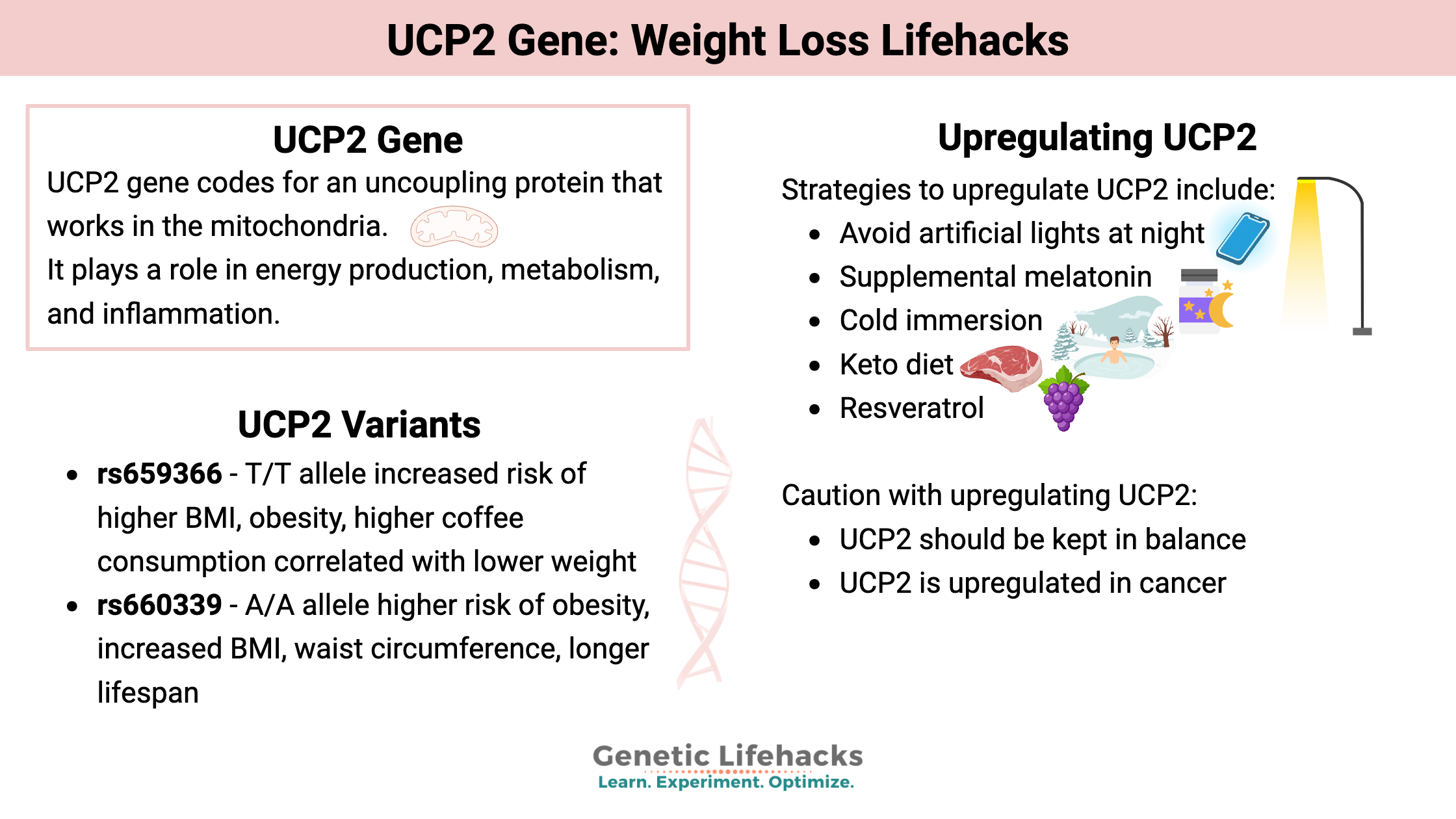Weight loss has become a very profitable billion-dollar industry. However, we can instead invest in ourselves and apply lifehacks to meet the same goals.
Understanding your UCP2 variants can give you a head start in understanding your weight loss and what might work best for you.
What does the UCP2 gene do?
Turning up the heat on your metabolism is the job of UCP2. The UCP2 gene codes for an uncoupling protein that works in the mitochondria (energy powerhouse) of our cells, producing heat through the uncoupling of the protons.
UCP2 is found in various tissues throughout the body, including white and brown fat cells, muscle, liver, kidney, heart, liver, lungs, and more.[ref]
In addition to producing heat from the proton gradient in the mitochondria, UCP2 also mitigates the production of reactive oxygen species (ROS). Thus, it plays a role in energy production, metabolism, and inflammation.
UCP2 Genotype Report:
Members: Log in to see your data below.
Not a member? Join here.
Why is this section is now only for members? Here’s why…
Access this content:
An active subscription is required to access this content.
Lifehacks:
Light:
One study in Bali found that the UCP2 genetic variant only contributed to an increased risk of obesity in urban people (compared to rural).[ref] Some environmental differences between urban environments and rural would include the presence of more light at night and a greater likelihood of staying up later, as well as a difference in the types of food eaten.
Related Article: Color TV has made us fat: melatonin, genetics, and light at night
Access this content:
An active subscription is required to access this content.
Related Articles and Topics:
References:
Baturin, A. K., et al. “[The study of the association of polymorphism rs659366 gene UCP2 c obesity and type 2 diabetes among residents of the Moscow Region].” Voprosy Pitaniia, vol. 84, no. 1, 2015, pp. 44–49.
“Burning More Fat With Cold.” Ben Greenfield Fitness – Diet, Fat Loss and Performance Advice, 17 Sept. 2012, https://bengreenfieldfitness.com/article/fat-loss-articles/burning-more-fat-with-cold/.
Dalgaard, Louise T. “Genetic Variance in Uncoupling Protein 2 in Relation to Obesity, Type 2 Diabetes, and Related Metabolic Traits: Focus on the Functional −866G>A Promoter Variant (Rs659366).” Journal of Obesity, vol. 2011, 2011, p. 340241. PubMed Central, https://doi.org/10.1155/2011/340241.
de Souza Rocha, Gabrielle, et al. “Effects of Resveratrol, Grape Juice or Red Wine Consumption Irisin Levels and Fibronectin Type III Domain Containing Protein 5 and Uncoupoling Protein Gene Expression Modulation in Rats.” Clinical Nutrition Experimental, vol. 5, Feb. 2016, pp. 1–5. ScienceDirect, https://doi.org/10.1016/j.yclnex.2016.02.001.
Martinez-Hervas, Sergio, et al. “Polymorphisms of the UCP2 Gene Are Associated with Body Fat Distribution and Risk of Abdominal Obesity in Spanish Population.” European Journal of Clinical Investigation, vol. 42, no. 2, Feb. 2012, pp. 171–78. PubMed, https://doi.org/10.1111/j.1365-2362.2011.02570.x.
—. “Polymorphisms of the UCP2 Gene Are Associated with Body Fat Distribution and Risk of Abdominal Obesity in Spanish Population.” European Journal of Clinical Investigation, vol. 42, no. 2, Feb. 2012, pp. 171–78. PubMed, https://doi.org/10.1111/j.1365-2362.2011.02570.x.
Muhammad, Harry Freitag Luglio, et al. “The Interaction between Coffee: Caffeine Consumption, UCP2 Gene Variation, and Adiposity in Adults-A Cross-Sectional Study.” Journal of Nutrition and Metabolism, vol. 2019, 2019, p. 9606054. PubMed, https://doi.org/10.1155/2019/9606054.
—. “The Interaction between Coffee: Caffeine Consumption, UCP2 Gene Variation, and Adiposity in Adults-A Cross-Sectional Study.” Journal of Nutrition and Metabolism, vol. 2019, 2019, p. 9606054. PubMed, https://doi.org/10.1155/2019/9606054.
Oktavianthi, Sukma, et al. “Uncoupling Protein 2 Gene Polymorphisms Are Associated with Obesity.” Cardiovascular Diabetology, vol. 11, Apr. 2012, p. 41. PubMed Central, https://doi.org/10.1186/1475-2840-11-41.
Pan, Pan, et al. “Melatonin Balance the Autophagy and Apoptosis by Regulating UCP2 in the LPS-Induced Cardiomyopathy.” Molecules (Basel, Switzerland), vol. 23, no. 3, Mar. 2018, p. E675. PubMed, https://doi.org/10.3390/molecules23030675.
Rose, Giuseppina, et al. “Further Support to the Uncoupling-to-Survive Theory: The Genetic Variation of Human UCP Genes Is Associated with Longevity.” PLOS ONE, vol. 6, no. 12, Dec. 2011, p. e29650. PLoS Journals, https://doi.org/10.1371/journal.pone.0029650.
Salopuro, Titta, et al. “Variation in the UCP2 and UCP3 Genes Associates with Abdominal Obesity and Serum Lipids: The Finnish Diabetes Prevention Study.” BMC Medical Genetics, vol. 10, Sept. 2009, p. 94. PubMed, https://doi.org/10.1186/1471-2350-10-94.
—. “Variation in the UCP2 and UCP3 Genes Associates with Abdominal Obesity and Serum Lipids: The Finnish Diabetes Prevention Study.” BMC Medical Genetics, vol. 10, Sept. 2009, p. 94. PubMed, https://doi.org/10.1186/1471-2350-10-94.
Souza, Bianca Marmontel de, et al. “The Role of Uncoupling Protein 2 (UCP2) on the Development of Type 2 Diabetes Mellitus and Its Chronic Complications.” Arquivos Brasileiros de Endocrinologia & Metabologia, vol. 55, June 2011, pp. 239–48. SciELO, https://doi.org/10.1590/S0004-27302011000400001.
Sreedhar, Annapoorna, et al. “UCP2 Overexpression Redirects Glucose into Anabolic Metabolic Pathways.” Proteomics, vol. 19, no. 4, Feb. 2019, p. e1800353. PubMed, https://doi.org/10.1002/pmic.201800353.

